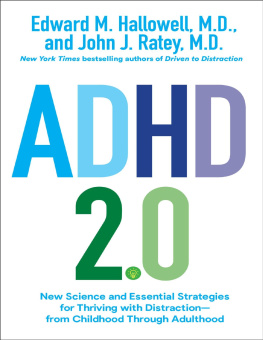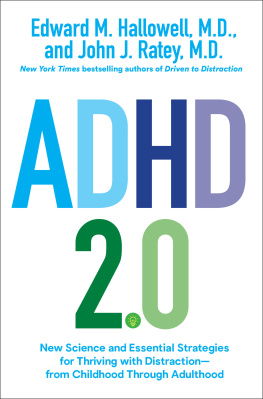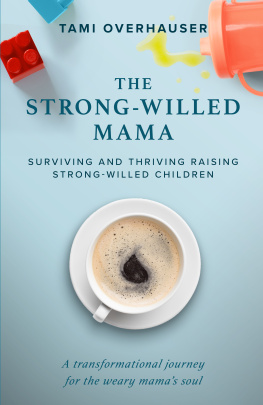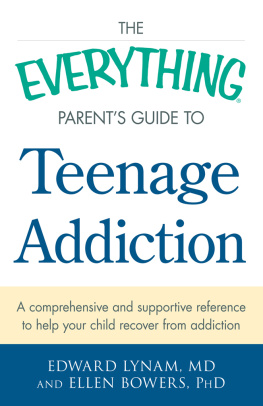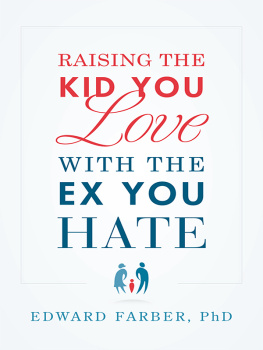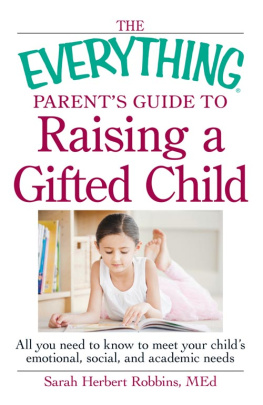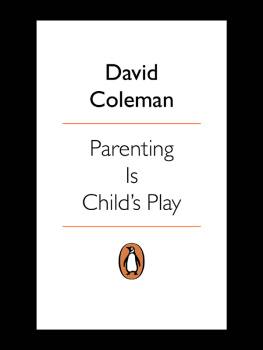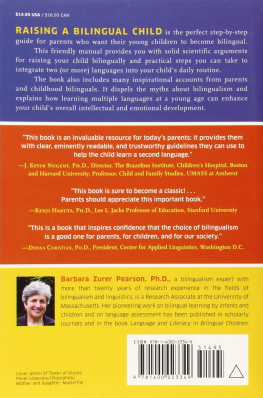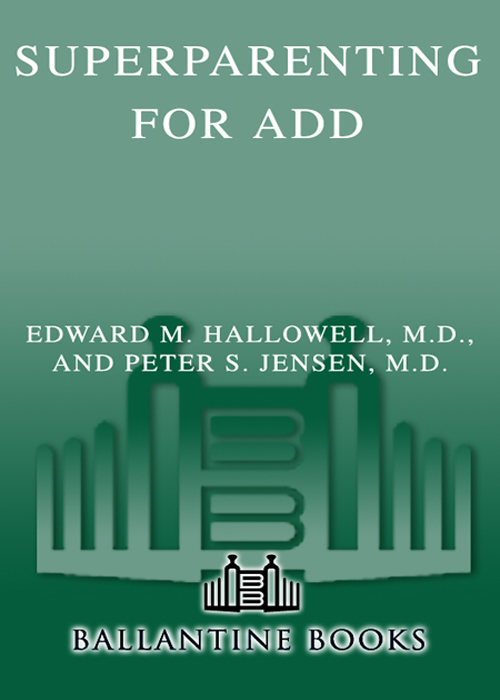
Superparenting for ADD
Edward M. Hallowell, M.D., and Peter S. Jensen, M.D.
Ballantine Books
Contents
Introduction
Childhood is about unwrapping the gifts youre born with. Every child is born with certain gifts, some easy to unwrap, some difficult. Children who have the fascinating trait called ADD (or ADHD, the term that the official diagnostic system used across much of the world) possess extraordinary gifts, but these gifts are unusual in that they can be hidden, and even once found they can be quite difficult to unwrap. In this book, we offer you instructions on how to find and unwrap them.
We do not intend this book to be a comprehensive guide to the treatment of ADD in children. We have both already written our own versions of that. Peter Jensens include the academically oriented volume entitled Attention Deficit Hyperactivity Disorder: State of the Science, Best Practices as well as his comprehensive guide to help parents find the help they need for their children, entitled Making the System Work for Your Child with ADHD. Mine include the series I wrote with John Ratey, Driven to Distraction; Answers to Distraction; and Delivered from Distraction, as well as the book I wrote with Catherine Corman, Positively ADD.
We dont want to repeat whats in those books, so we refer you to them for material not presented in this book, such as a detailed discussion of medications, a critical appraisal of alternative and complementary treatments, details of a proper diagnostic workup, an in-depth discussion of family problems that typically arise when a child or parent (or both) has ADD, a discussion of the biological and genetic bases of ADD, speculation on the influence of media and environment in the causation of ADD and ADD-like syndromes, advice on the classroom management of ADD, a discussion of the role of brain scans in diagnosing ADD, an in-depth discussion of the role of coaching and tutoring, and various other topics not presented in great depth, if at all, in this volume.
If all of that isnt in here, what is in here? What is in here is what you need most as a parent (or teacher, or any concerned person) to bring out the best in your child if your child has ADD. Ive written in my other books about the need to focus on strengths when dealing with adults who have ADD. Adults can handle this shift in emphasis, but I continue to hear from parents of kids with ADD that they need a more-detailed plan. They want to know what a strength-based model looks like day in and day out. They ask me, What do we do? It is largely in response to that question that Peter Jensen and I offer this book.
Based on a conviction derived from our combined half century of experience in working with children who have ADD, we know that they possess enormousif often hiddentalents. So this book describes a method by which children who have ADD can do far more than just get by. They can thrive. They can soar beyond where they, their teachers, and even their parents might have thought they ever could. By identifying and developing childrens interests and inborn abilities, this method draws out the often-camouflaged talents and strengths of these remarkable children, children who, without the proper kind of help, often languish and lead lives of chronic dissatisfaction, frustration, and underachievement. But it positively doesnt have to be that way! To the contrary, these kids can achieve at the very highest levels, and lead lives of tremendous success and joy. We emphasize what you need to know to fully unwrap the gifts embedded in those who have ADD. We follow a strength-based approach, which means that we start by looking for talents and only secondarily do we look at whats getting in the way of the development of those talents. This is not commonly emphasized with ADD, and it ought to be. We present a positive, hopeful approach, because our experience as child psychiatrists and as parents of children with ADD, along with Peters perspective as a scientist studying ADD, has convinced us that this brings far and away the best results.
briefly outlines how to make the diagnosis and describes various treatments, but in much less detail than can be found in our other books. The heart of this book is the explanation of a strength-based approach and practical tips on how to use it.
Over the years, parents have given us the most compelling descriptions of what it is like to raise a child who has ADD as well as the most salient advice on how to do it. We have learned more from them, and from their children, than from any other source.
I was, therefore, thrilled when Peter Jensen told me he had systematically gathered written reports from scores of parents, a few of whom are quoted in this book. As you read what these wonderful parents have to say, you will feel their pain and admire their courage. You will also learn from their advice. You will see how often they know their children possess unacknowledged or undeveloped talents and strengths, and how desperately they seek and need a strength-based model of treatment. You will wince as they speak of their frustration with other peopleteachers, doctors, in-laws, grandparents, spouseswho just dont get it, and who seem almost intentionally to overlook what a given child might be good at or potentially good at. You will marvel at their tenacity as they recount how many places they had to look before finding the right kind of help. And you will feel hope and joy as you see them and their children score various victories against great odds.
In combining the knowledge and experience of two child psychiatrists, this collaboration brings together authors of different backgrounds. I trained at Harvard and served on the faculty of Harvard Medical School for twenty years, but in my career I have primarily been a clinician who sees patients, as well as an author of some fifteen books. I have ADD and so do two of my children.
Peter is more the scientist and researcher, having served as associate director for child and adolescent research at the National Institute of Mental Health, where he was the lead NIMH investigator on the large Multimodal Treatment of ADHD (MTA) study. In 2000 he became Ruane Professor of Child Psychiatry at Columbia and the director of the Center for the Advancement of Childrens Mental Health; in 2007, he was named president and CEO of the REACH Institute (REsource for Advancing Childrens Health). He is the author of more than 250 scientific articles and book chapters and has written or co-edited eighteen books on childrens mental health. Two of Peters children have ADD. Together, we hope our professional and personal experience with ADD will bring a depth of understanding and insight to you in your role as a parent of a child with ADD.
In creating this book, we decided it would be best stylistically for there to be one narrative voice. So while the material presented here emerged from a joint effort, when you hear a first-person narrator, that voice is mine (Edward M. Hallowells). The term we refers to our shared convictions and experiences. Peter Jensens experiences or recommendations are noted explicitly as such arise. In the few areas where our recommendations or beliefs differ, we make this explicit.
For simplicitys sake, throughout this book we use the term ADD, short for attention deficit disorder, rather than ADHD or AD/HD. When we quote other people, they may use the term ADD or ADHD. The significant point to recognize is that there can be ADD without hyperactivity. In other words, you can have an attention deficit disorder but show no signs whatsoever of hyperactive or impulsive and disruptive behavior. In the diagnostic manual that condition is called
Next page

